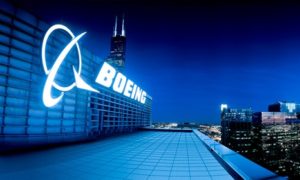 Aircraft maker Boeing has unveiled a new unmanned electric vertical-takeoff-and-landing (eVTOL) cargo air vehicle (CAV) prototype that will be used to test and evolve Boeing’s autonomy technology for future aerospace vehicles.
Aircraft maker Boeing has unveiled a new unmanned electric vertical-takeoff-and-landing (eVTOL) cargo air vehicle (CAV) prototype that will be used to test and evolve Boeing’s autonomy technology for future aerospace vehicles.
The CAV is designed to transport a payload of up to 500 pounds (227 kilograms) for possible future cargo and logistics applications, said Boeing in a statement.
“This flying cargo air vehicle represents another major step in our Boeing eVTOL strategy,” said Boeing chief technology officer Greg Hyslop. “We have an opportunity to really change air travel and transport, and we’ll look back on this day as a major step in that journey.”
Powered by an environmentally friendly electric propulsion system, the CAV prototype is outfitted with eight counter rotating blades allowing for vertical flight. It measures 15 feet long (4.57 meters), 18 feet wide (5.49 meters) and 4 feet tall (1.22 meters), and weighs 747 pounds (339 kilograms).
A team of engineers and technicians across the company designed and built the CAV prototype in less than three months. The CAV successfully completed initial flight tests at Boeing Research & Technology’s Collaborative Autonomous Systems Laboratory in Missouri, U.S.
Boeing researchers will use the prototype as a flying test bed to mature the building blocks of autonomous technology for future applications. Boeing HorizonX, with its partners in Boeing Research & Technology, led the development of the CAV prototype, which complements the eVTOL passenger air vehicle prototype aircraft in development by Aurora Flight Sciences, a company acquired by Boeing late last year.
“Our new CAV prototype builds on Boeing’s existing unmanned systems capabilities and presents new possibilities for autonomous cargo delivery, logistics and other transportation applications,” said Steve Nordlund, Boeing HorizonX vice president.
“The safe integration of unmanned aerial systems is vital to unlocking their full potential. Boeing has an unmatched track record, regulatory know-how and systematic approach to deliver solutions that will shape the future of autonomous flight.”
Chicago-based Boeing is the world’s largest aerospace company and leading manufacturer of commercial jetliners and defense, space and security systems.









